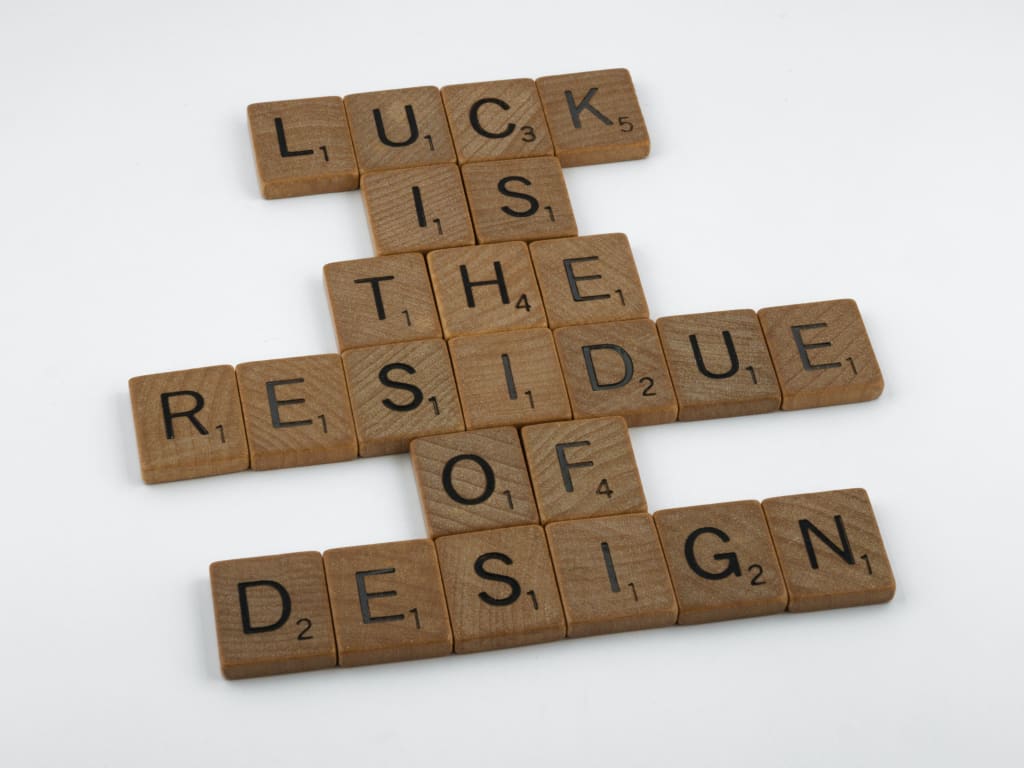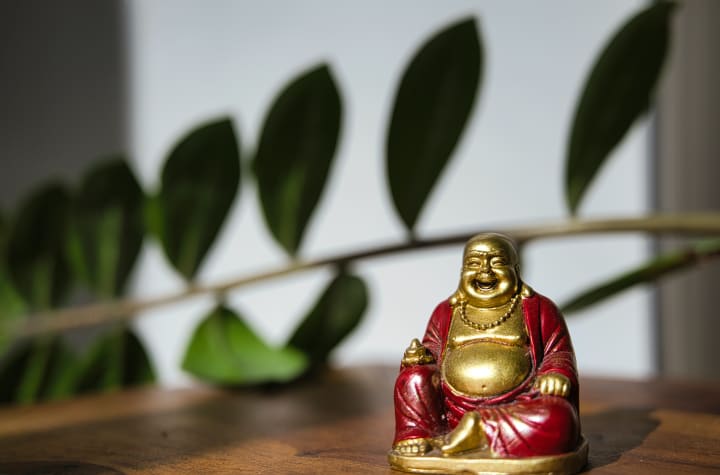
What is luck? How do we define such a concept? Luck is said to be a phenomenon or belief that certain unseen forces can bring about positive or negative experiences in your life. Some people believe they have good luck in life and attribute their success to such, others on the other hand believe the opposite and believe the world to be against them in terms of being lucky. And then there are those that don’t believe in luck at all. I’ve always said life is about perspective. Maybe luck is too. So? Many people ask, does luck even exist?
Psychologically Speaking
My father has always been one of those people who believe in luck but believes he has always had bad luck. He once said to me, “I have no good luck, but I have bad luck. Only 2 out of over 85,000 people get cataracts from Symbicort. I can’t win a horse race with odds of 8/1, but I can get cataracts with odds of 1/42,500.” He was born with bad eyesight so we don’t know if it was the medication or not. Human beings are often driven to determine why something happened. The reasoning behind your the outcome of an event or incident. In psychology, luck is often referred to as attribution. Attribution research in psychology is mainly focused on people’s perceptions as to why someone did something specific or why someone became a success or a failure. Those who experience an event where there are variable factors they cannot control, often attribute it to luck, for example, an automobile accident. Luck is seen in a manner of different ways to each individual and circumstance. Some see it as a birthright, something they were born into, perhaps wealth or power in the family, and some see it as a simple happenstance.
Psychologist Richard Wiseman has spent a great deal of his career researching how we as humans perceive luck. He has come to the conclusion that each individual makes their own luck from within based on how they view their own life and world. Through a decade worth of interviews and experiments with 400 men and women aging from 18 to 84 years old, he has come to realize that those who consider themselves lucky tend to view life a bit more open-mindedly. In one particular experiment, he took two groups of people, those who considered themselves lucky and those who did not, and had them both read the same newspaper. He tasked them with counting all photographs throughout the newspaper. He found that the ones who felt lucky were, in fact, more open-minded and they found on just the second page a headline that stated, “Stop counting – There are 43 photographs in this newspaper.” Halfway through another headline read, “Stop counting, tell the experimenter you have seen this and win $250.” Most of those people in the experiment that believed themselves unlucky did not notice the headlines and in turn, missed the opportunity.

The 4 Kinds of Luck
American Professor of Philosophy and Law Thomas Nagel, born in 1937, was well known for his research and interest in the philosophy of the mind, political philosophy, and ethics. It was during his research and work on the idea of “Moral Luck” that he discovered the types of luck that affect our actions, intentions, and will. The 4 types of luck he found to distinguish us morally included Resultant Luck, Circumstantial Luck, Constitutive Luck, and Casual Luck.
- Resultant Luck, also known as Consequential Moral Luck, is simply that. Luck that occurs because of someone’s actions or choices and just happens to be the way an incident happens to play out.
- Circumstantial Luck is said to be the luck that occurs due to the particular circumstance or situation a person is in at that moment.
- Constitutive Luck is luck in who we are as people, our traits and characteristics or personality. His thought was that since we are a make-up of genes, environmental influence, peers, and those who raised us, they can contribute to who we are. Since the way we act often reflects who we are, his theory here is that constitutive luck plays a part as well. The chance card.
- Casual Moral Luck is the problem of “free will.” A determined case in which a person has zero control in.
Luck and Superstitions

Superstitions go back centuries with most of them today being learned or even habitual acts. Luck and superstition often go hand in hand. Many believe that superstitions were created so that the early days of mankind could create a way to understand actions in the world that were caused by unseen forces. The Greeks are said to be the origin of many superstitions. The modern day tradition of making a wish with candles on a birthday cake come from the ancient tradition when Greeks baked moon shaped cakes to ask favors to the moon Goddess Artemis. Ptolemy believed shooting stars were the Gods looking down upon the Earth and it was then a good time to make a wish. Black cats for instance were viewed as good luck in times of ancient Egypt until the Pope in 1232 AD declared them an “incarnation of Satan.” Knocking on wood is said to be Celtic in origin and comes from a time when people believed spirits lived in trees and could be called upon for protection. The modern day notion that breaking a mirror brings 7 years of bad luck supposedly comes from ancient Romans who believed that the soul was reflected in a mirror and that it renewed every 7 years, therefore if you broke a mirror your soul would be damaged for 7 years. Interestingly enough the list of superstitions goes on and mostly are subjected to either cause or bring about either good or bad luck.
Luck and Objects

Throughout the world, numerous objects, charms, tokens, and talismans are said to bring good luck. With travel in todays world, many of these “good luck charms” are merely looked at as souvenirs but for the few who truly believe in their unseen power, they know that with each object comes a deep history and culture behind it. The four leaf clover being one of the most well known lucky charms is Irish in nature. They say the four sides represent faith, hope, luck and love and are rare to find with the odds of finding 1 in every 10,000 clovers. The horseshoe is one to debate. The idea of it being a symbol of luck is common but many debate whether it should be placed with the points down to pour luck over you or up to catch the good luck. The horseshoe has been seen in both Islamic art and Egyptian history. The Laughing Buddha found in India and Thailand has always been a representation of good fortune. Superstition says though that the luck is only effective if you rub the stomach of the Buddha daily. Scarab amulets from Egypt represent eternal life and new creation. Countless objects, talismans, and amulets from around the world are said to hold some form of mystical or unseen force that people naturally look at as luck. I believe it says a lot about the human nature of man himself and the want to believe and make sense of things in life.
How To Improve Your Luck

The Luck Factor, 4 scientifically proven yet basic principles, was developed by Richard Wiseman during his 10-year-long research into luck. He is believed to have identified just a few ways to perhaps increase good fortune if you so wish. Those include possibilities, intuition, intentions, and reframing.
Maximize Choice Opportunities. The so-called lucky few have been known characteristically to be good at creating, noticing, and acting upon opportunities presented to them. It is said they tend to build a network of luck like the way the concept of the 6 Degrees of Separation works. The idea that everything you may need or want is within 6 steps or connected people to you.
Listen to Intuition. Studies have shown that gut instinct is a credible way of making better decisions at times. Those who take steps to become relaxed with a clear mind through activities such as meditation tend to respond to a hunch or gut feeling that serves them for the better.
Ambitions and Expecting Good Fortune. Lucky people often carry with them a positive attitude. These are “the glass is half full” kind of people, the optimists. It’s been found that people who continue to persevere and go into a circumstance with the thought of a positive outcome already being present would call themselves lucky.
Turning Bad Luck Into Good Luck. Again, we see the optimists. Those who see the good with the bad, whether it’s in the long run or with the attitude of it could have been worse. Lucky people don’t dwell on their ill-fortune.
In various cultures and religions, luck can be viewed by many different names. Destiny, blessings, faith, grace, karma, miracles, serendipity, Tao in Chinese philosophy, cosmic forces, and my favorite, the law of attraction. I am a firm believer in the law of attraction and the research behind it has shown its validity. The law of attraction is the idea that “like attracts like.” It has been proven that people can physically manifest things in their life both good and bad based on where they focus their intentions. The best way to invoke the law of attraction in your own life is through affirmations and visualizations. One of my favorite books is a book called The Secret by Rhonda Byrne. An excellent book in my opinion and one everyone should read. She calls it the secret to life itself, the law that determines every moment and experience in the whole of the universe. She says the key to success in the law of attraction is to ask, believe and receive. Ask for what you want in a way that is positive only, believe that you already have what you want, and then allow yourself to feel good about it and the universe will, in turn, present the opportunity to you to receive what it is you want.
Luck seems to play a part in so many aspects of our daily lives. From lucky and unlucky numbers like 7 and 13 to lucky and unlucky animals and objects. Many people play the lottery regularly when it’s purely a luck based thrill. Is it really lucky if a ladybug or a dragonfly lands on you? What about walking under a ladder, will that give me bad luck?
We live in a world that’s driven by energy and frequencies resonating all around us. Throughout our known history the law of attraction has been a profound thought, dating back to Egypt and Babylonian times. Maybe luck really is just part of the unconscious brain. So, does luck really exist in the physical world? Or is it just a myth that has no influence in mankind. I suppose that’s up to each individual to decide. What seems to be certain though is that if it does exist, you must believe in good luck for it to be good. Resonate in your own POSITIVE energy. The mind is a powerful thing. But as long as I’m alive I’ll choose to believe that luck does exist, and that I can certainly make my own good luck. As the renowned baseball player and sports executive Branch Rickey used to say, “luck is the residue of design.”

About the Creator
Sammantha
I believe strongly in enjoying the little things in life. Reading and writing are both a passion of mine, something that ignites fire in the soul. A good piece of literature with some poetic writing is what I live for each evening.






Comments
There are no comments for this story
Be the first to respond and start the conversation.